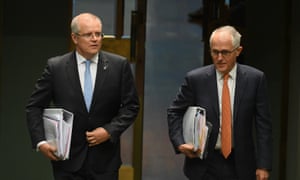Extract from The Guardian

Scott Morrison and Malcolm Turnbull must beware of giving in to special pleading. Photograph: Lukas Coch/AAP
Contact author
Saturday 13 May 2017 10.04 AEST
On budget night Parliament House pulses with fundraising and networking shindigs, no matter which party’s treasurer stands up at 7.30pm to deliver the speech.
As always, there were multiple events this year, including a dinner in the great hall and many more intimate soirees, including one in Julie Bishop’s office that the prime minister reportedly described as the “hottest ticket in town”, attended by the likes of Seven West Media chairman Kerry Stokes and Virgin boss John Borghetti.
Malcolm Turnbull and senior ministers put in an appearance at as many as they can, chatting with chief executives, moguls and lobbyists (many of them former politicians) who also get to raise a glass with senior advisers and party powerbrokers (some of whom are also lobbyists).
It’s a cosy circle of power, access and influence, and those working the rooms expect, at the very least, some prior notice if a government is about to drop something unpleasant in their laps.
It’s not at all unusual for a budget to propose life-changing policy shifts for, say, the unemployed or single parents, without prior discussion about how they might work, but it is unusual to for the connected and networked to be surprised by changes that materially hurt their interests.
This explains at least some of the banks’ fury when they learned, not long before the budget speech, that they were about to be hit with a “levy” to raise billions of dollars.
Now they are threatening to respond in the typical manner of business scorned – a big spending “mining tax-style” advertising campaign. That $22m spent by the mining industry in just six weeks in 2011 to rail against the Rudd government’s resource super profits tax has become something of a gold standard in corporate tactics to overthrow an elected government’s decisions. It significantly contributed to Labor’s slump in the polls, which spurred the party to overthrow Rudd as prime minister in favour of Julia Gillard, who “renegotiated” the tax with the industry itself into one which raised almost no money, which meant it was easy for the incoming Abbott government to repeal. Mission accomplished.
Another group aggrieved by the budget’s school funding decision – announced before Tuesday night – is also resorting to time-honoured methods of special pleading. The Catholic education system’s history of special deals with governments is one reason Australia’s schools spending is out of whack with actual student need, which is of course what the Gonski funding model is supposed to rectify.
When Labor introduced the original Gonski plan one aim was to unpick the Howard government’s 2004 special funding deal for non-government schools (independent and Catholic) – an arrangement the then minister Brendan Nelson later told the Australian newspaper was always intended to be temporary. The provisions for Catholic schools had been unveiled by Howard and Cardinal George Pell ahead of that year’s federal election and continued until the Gonski report suggested radical modification.
But then the Gillard government also ran into extreme political pushback and ended up guaranteeing first to the Catholic sector, and then to all non-government schools that they would keep at least the same share of total public funding that they had before Gonski, no matter what changes occurred in the real word to the distribution of disadvantaged or needier students, which somewhat undermined the whole idea of needs-based funding.
(Labor leader Bill Shorten’s promise to put more money into schools funding, if elected, is a legitimate point of difference between the parties, but it is less clear how he can take on the Catholic school’s cause against Gonski 2.0’s plan to level the playing field, and still claim to advocate needs-based funding principles.)
The banking move (accompanied by quite extraordinary new regulations on banking executives) is – as armies of commentators have noted for days now – part of a pretty dramatic shift from the small government, low taxing-ideology the Coalition espoused until Tuesday. In fact the whole budget is a course correction steering somewhere between progressive policies and populism, in some respects abandoning ideas both major parties once held dear. (Remember when the global flow of highly skilled labour was seen as a good thing?)
It doesn’t just deny Shorten his sharpest points of policy differentiation, it also works to cut off common cause between ideological conservatives like Cory Bernardi and right-wing parties like Pauline Hanson’s who appeal to voters who just want solutions to their perceived economic exclusion and aren’t much fussed about ideology.
The obvious danger is that those voters just won’t believe this shift is the real deal. Which is where the cosy privilege of the budget night parties comes in.
Turnbull and Morrison already have to shimmy between their argument that they were forced into tax hikes by the recalcitrant Senate’s refusal to pass Tony Abbott’s spending cuts, and their simultaneous insistence that they are motivated by a newfound understanding of what’s fair.
But imagine if they caved in to slick ads or lobbying by the banks (presuming the banks’ spin doctors could somehow figure out how to pitch a campaign that got around voters’ loathing). Imagine if another deal with the Catholic schools (beyond legitimate reviews of the detailed calculations) unleashed the obvious charge of unfair treatment from the independent schools and needs-based funding came unstuck yet again.
The CEOs and lobbyists and corporate suits have obvious power and special access. But that same special access fuels voter resentment. People are sick of a system where the person with the most influence and the biggest lobbying budget wins. And the government must know that giving in to special pleading in this political environment would instantly and fatally confirm its repositioning as a con.
No comments:
Post a Comment